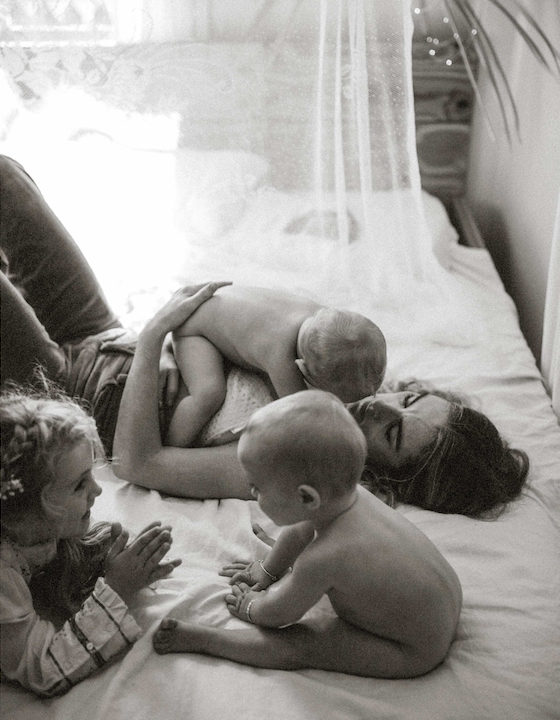For as long as I can remember, the center of my life has focused on my health. It’s oscillated between me being focused religiously on keeping up healthy habits (eating right, working out) to feeling sorry for myself that my body doesn’t perform the way I want it to, the way I perceive everyone else’s does.
When my friends started having babies, when I started watching their bodies shapeshift and create life, next to being incredibly excited, my thought first was, “My body cannot handle that.” I just felt it in my gut.
This gut feeling was confirmed by several medical and mental health professionals, most of whom wouldn’t directly tell me not to try to get pregnant but instead would say things like, “If you were my daughter, I’d look into other options.” Or, “We could do this, but you’ll have to be at the cardiologist weekly.” The idea that the doctor thought HE (of course, he) was “doing” anything in and of itself baffled me. This was my underperforming body we were talking about. There’s no “we” there.
The popular narrative is that you try everything until there are no other options, but I felt like I had tried everything to feel healthy and failed for the past 30+ years. Why not use this as a chance to change the script? Why not start from a place of planning versus waiting for failure and disappointment?
My (incredibly amazing and supportive) husband and I ultimately went down the complex, wild (insert pretty much any adjective here) surrogacy path. And next month, we’re expecting a baby girl. The process has been bizarre and beautiful, and I am so excited to become a mother. I’ve read all the articles (on Babe, of course). I’ve started assembling the nursery (cute crib sheet ideas, anyone?). I’ve figured out how to respond to the misinformed people who show concern when I tell them I’ll be formula feeding…
And, yet, as the reality of becoming a parent inches closer, I find myself grappling with a new set of health concerns, this time centered around my mental well-being. The anticipation of our child has, expectedly, stirred up a whirlwind of emotions, from joy to anxiety and fear. As a person who’s always been acutely aware of my physical and mental health, I started to wonder: Sure, it’s normal to be anxious about change, but the big stuff, the big “P” — POSTPARTUM … Is it possible that something could be happening to me even though I’m not carrying? Might be susceptible, too?
Cue my go-to: call a doctor. I spoke to Elizabeth Baron, LMHC, about this and more on what chemical or mental effects non-carrying parents can anticipate and plan for. Here is what I’ve learned.
Can you explain what postpartum depression is and how it might affect non-carrying parents?
I first want to introduce the acronym PMADs, which stands for perinatal mood and anxiety disorders (PMAD). Let’s be sure to use this terminology rather than “postpartum depression” because there are more mental health conditions, in addition to depression, that can arise during the perinatal period and for non-carrying parents, too. PMADs, or perinatal mood and anxiety disorders, are a group of illnesses that affect at least 1 in 5 women during pregnancy and the postpartum period. Those of us who do this work know that it’s more like 1 in 3, yet roughly half of the women struggling with their mental health after pregnancy do not receive treatment due to a lack of awareness about symptoms and treatments, an inability to access resources, and often stigma.
PMADs include depression, anxiety, OCD, PTSD, and, in the most severe cases, psychosis. PMADs cause emotional and physical challenges that make it hard for women to function adequately and care for themselves, their babies, and their families.
There are several risk factors. While there is a genetic and biological component to PMADs, and you are at greater risk if you have a history of mental illness or someone in your family does, there are several other risk factors that we want to be paying attention to, especially for non-carrying parents. If someone struggles with stressful life events or circumstances such as financial hardship, relationship issues, physical/sexual abuse, or substance use, they are more likely to develop a PMAD. In addition, if someone has decided to have a baby and be non-carrying, possibly because of recent, recurring, or unresolved loss, they are more likely to experience a PMAD.
How common is post-partum depression in non-biological parents, such as adoptive parents or those who used surrogates?
I think there’s even more pressure on adoptive parents or those who have used surrogates to minimize their more challenging emotional experiences due to societal pressure and potentially internalized pressure. For example, those who are adopting or who have used surrogates might spend the pregnancy anticipating what it’s going to feel like to meet their baby in similar ways to those who are carrying, yet, non-carrying parents have a whole host of additional worries that such as, “Will we be just as connected if I were carrying?” or “Will the baby know I am the parent?” These are totally understandable worries and non-carrying parents deserve just as much time as those who carry to bond and get to know each other. If this worry continues, persists, and impacts a parent’s functioning, we want to be thinking about a potential PMAD at play.
And our beloved pops? What about dads?
While PPD in dads is not as well documented, research suggests that between 4 and 25 percent of first-time dads suffer from PPD. Depression is also highly linked with anxiety; about half of people diagnosed with major depressive disorder are also diagnosed with at least one anxiety disorder. Bringing a baby home is also a massive shift for dads and can hit men equally as hard. Some new fathers feel under increasing social pressure to be involved in their children’s lives from the get-go, many return to work immediately and some dads can simply feel isolated in their experiences, as gender roles have influenced the idea that “men don’t talk about feelings.” Men, too, struggle with a sense of guilt, inadequacy and feelings of sadness, and we have to make space for them as well. It’s a wonderful time in the postpartum period to initiate couples therapy with a perinatal professional to [hit] pause, listen to one another, and process this massive life shift for your family.
What strategies can non-carrying parents use to manage and mitigate PMADs?
Individual therapy, support groups, and finding community are really important tools to combat PMADs. The good news is PMADs are 100% treatable with the right treatment. Finding a support group or attending group therapy during this time period, especially for those non-carrying is the most powerful intervention to protect against mental health challenges. To feel less alone and to sit with those who have truly walked in your shoes can feel so supportive and uplifting.
How can friends and family members support non-carrying parents experiencing PMADs?
When you ask how it’s going, truly ask the new mom how she is doing. We already know how the baby is sleeping – not very much!
When a mom enters the postpartum period, carrying or not, she receives an abundance of often well-meaning text messages such as, “OMG, he’s here!!” or “She’s adorable!” and “Can’t wait to meet her, more pictures please!” But behind the scenes, the new mom is trying to manage everything and keep a baby alive while processing this massive shift in her life. Try and focus directly on moms’ well-being, offering tangible support and more of an understanding of how to truly show up in an entirely different way – a mom-first way.
My favorite way you can help a family or friend going through PMADs is to figure out how to help without adding more pressure and stress to her plate. Give her concrete options, such as:
- Can I wash bottles for you?
- Want me to hold the baby while you shower?
- Can I take your toddler out to the swings later today?
- Got time for a hug?
Can you describe any specific treatment options or therapeutic approaches that effectively deal with PMADs?
Dialectical Behavior Therapy (DBT) is a form of Cognitive Behavior therapy designed by Dr. Marsha Linehan to treat a broad range of complicated symptoms and concerns. It is a highly effective treatment to help women struggling with PMADs.
It helps us tolerate challenging opposing feelings that exist all at the same time. I want to invite a non-carrying mother to engage in DBT to help them learn to continuously practice language that promotes “both-and” rather than feeling like they can only experience one feeling, one emotion, and one truth at a time. We, as humans, experience a wide range of emotions constantly. Sometimes moms with PMADs need a bit more help practicing this…
This might look like:
“I did not carry this baby AND I am grateful for his/her arrival.”
“I did not carry this baby AND I am a wonderful mother.”
“I could not carry this baby AND I am good enough.”
Can non-carrying parents take any preventative measures to reduce their risk of PMADs?
Finding supportive therapy and a support group is an important preventive measure that non-carrying parents can take to reduce their risk of PMADs. Having a baby through gestational surrogacy can feel exciting AND (hi, DBT :)) also stressful and lonely. Group support, such as the one linked here, provides space for intended parents to process the emotions accompanying gestational surrogacy, meet others in the same boat, and expand their awareness of their goals- and maybe get some extra help with logistics too, such as the unique experience of preparing for a baby who might be born in a different state!
Elizabeth Baron is a licensed mental health counselor and psychotherapist, specializing in
maternal mental health. She received her master’s degree in counseling psychology from
Columbia University’s Teachers College and has extensive clinical experience in supporting
women in all stages of their motherhood journeys— from preconception and pregnancy, through
postpartum and parenting.
She began her career as a psychotherapist at The Motherhood Center of New York (TMC),
where she developed her expertise in treating Perinatal Mood and Anxiety Disorders. In addition
to her clinical role at TMC she also served as the community lead and collaborated with
organizations and parent communities to host educational events and support circles. In 2020
she started her private practice where she offers emotional support, resources, and strategies to
women and families navigating their experiences into and through motherhood.
Deeply committed to destigmatizing maternal mental health issues on a global scale, Elizabeth
has also worked with several brands in the motherhood and parenting space and has appeared
on numerous expert panels, podcasts, and webinars. In Spring 2023, she is relaunching With
Elizabeth, a digital platform dedicated to building community online and in-person through
expert-led education, interactive group sessions, and strategic partnerships with other brands
and specialists. Her goal is to help moms and parents feel less alone, understand the
complexity of their experience, and have the space to process the emotional and mental load
associated with becoming parents and raising children.
Elizabeth lives in NYC with her husband and two young daughters, a preschooler and an infant.




